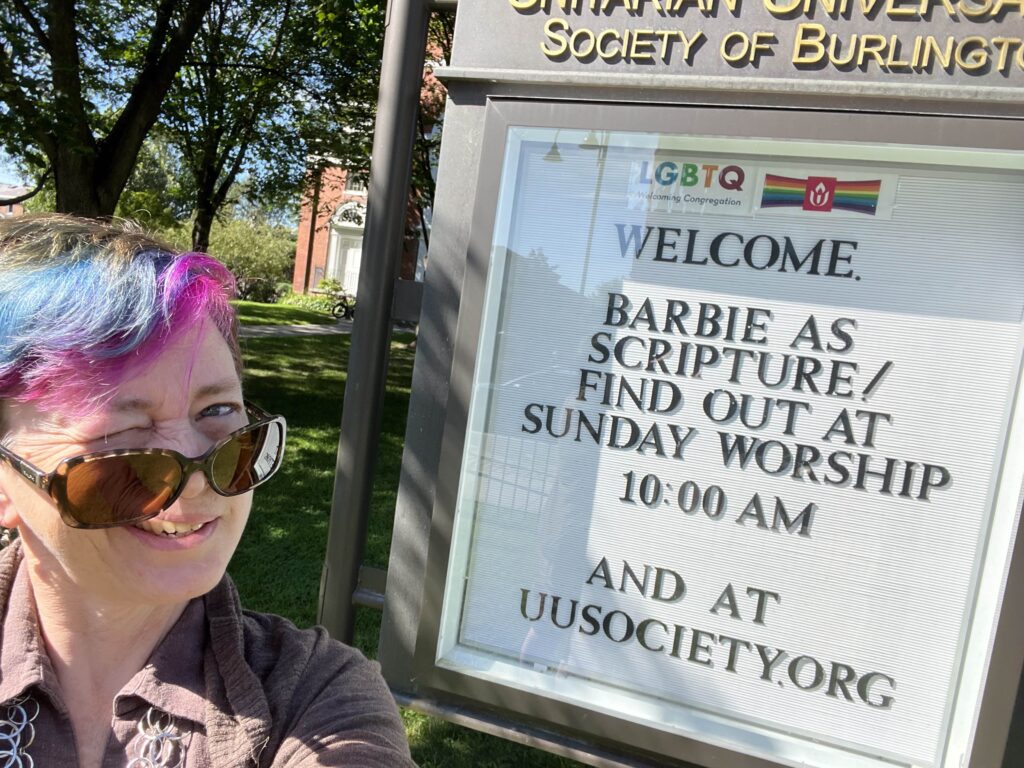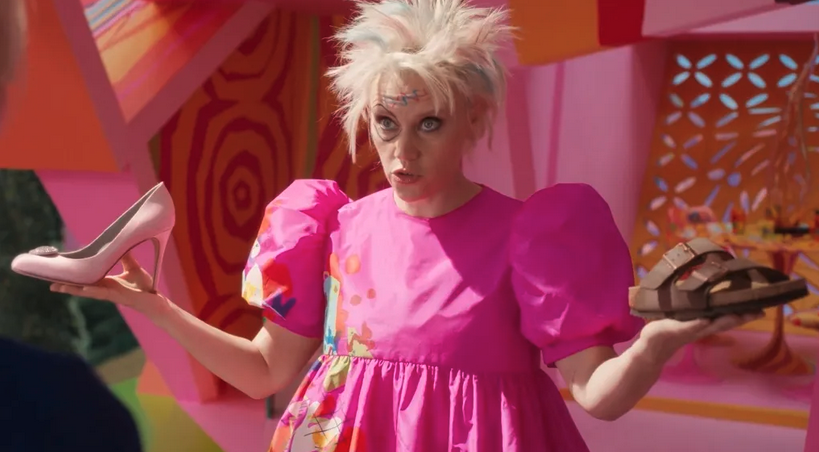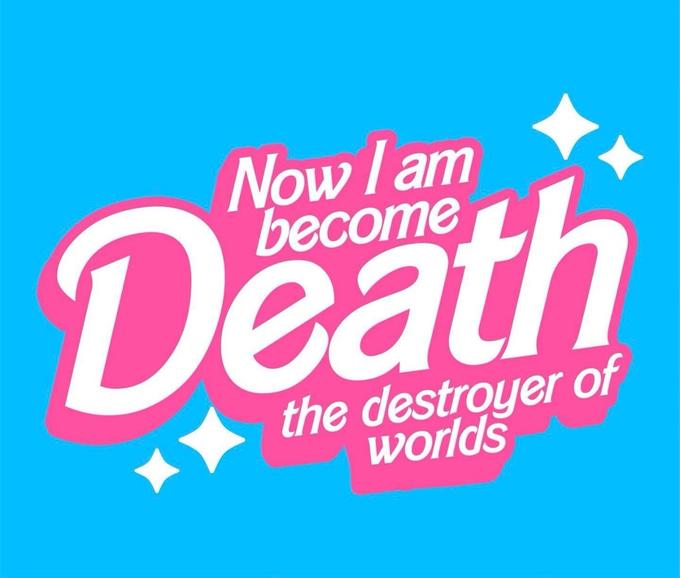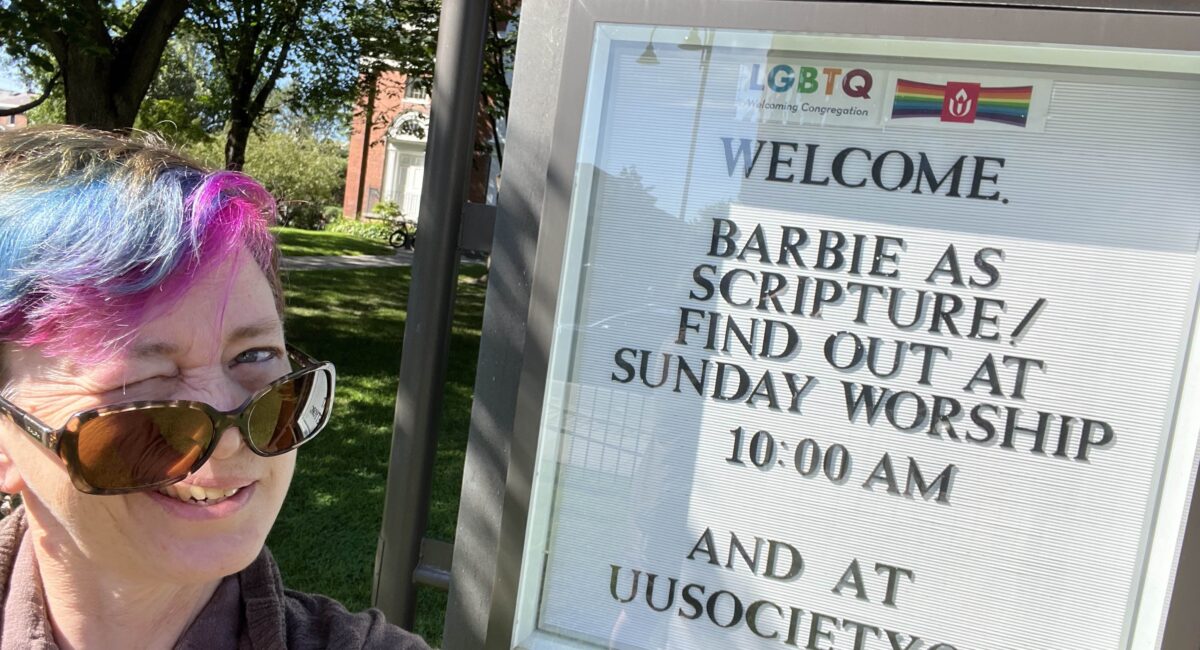First Unitarian Universalist Society Burlington
August 27, 2023

When I entered into Unitarian Universalism, having grown up in a fiercely atheist household, surrounded by rural fundamentalist Christians who had a strong sense of mission and a poor sense of boundaries, this need was beginning to take shape in me.

It was in Unitarian Universalism, when I was in my late twenties, that I experienced my own creative capacity for meaning making and affirmation of the impulse to explore the nature of god and the Universe, rather than have it boxed for me. Or have me boxed into place.

So says Stereotypical Barbie in the penultimate scene of the movie.

One of my colleagues, Rev. Juniper Meadows, wrote that even if Barbie the Movie is a “cash grab for Mattel” and that it was likely “all hot bright trash,” for her (as for me, as for many of us) it turned out to be far more profound than anticipated.
If you were surprised by my choice to preach on Barbie the Movie, if you hadn’t been planning on seeing it, or did so reluctantly because people can’t stop talking about it, or even if you are still committed to NOT seeing it…perhaps, by the end of this sermon, you will still feel the same way about seeing the movie.
That’s okay by me. I’m not trying to get you to see it or trying to make more money for Mattel.
But I hope you will come to feel differently about the movie itself. That it just might be a source of wisdom, even if it is an absurd source (one that uses extreme absurdity to make satirical points).
Alongside affirmation of its wisdom, one critique could easily be titled “the extreme limits of white feminism” given how the twin oppression, systemic racism, is not given equal or sufficient airtime as patriarchy is given. This movie might be about patriarchy and gender relations, but frankly, from my perspective, its message in this regard is pretty meh.
Where I think this movie is brilliant is in the hero’s journey – or perhaps we should call it a shero’s journey – of self-discovery, of sacrificial discernment, of finding one’s agency and meaning-making, and doing so in relationship with others. That part speaks to me: Barbie’s journey of getting closer to fine.


The sign on our front lawn promised that I would answer the question of whether Barbie the Movie is scripture.
Like ancient scriptures, recognized for centuries or even millennia, Barbie the Movie is full of provocative and problematic content, with lots of room for us to project our hopes and fears, and a wealth of clever conceits paired with sufficient vague-ness that we can decide for ourselves what it means, coming to completely contradictory conclusions as the person sitting next to you does. When you think about it that way, Barbie the Movie is definitely scripture.
It is also a source that helps us to make meaning and to reflect on our own lives. It is a source in which we might either find wisdom or, through engaging it, create wisdom. As such, we might call it scripture, particularly given our Unitarian Universalist value of pluralism: “celebrating that we are all sacred being diverse in culture, experience and theology.” Including theology that changes and shift over time as we engage our own spiritual seeking.
In the movie, we see Barbie’s theology shift. At first, she believes that her Creator has power over her. Stereotypical Barbie informs her Creator (well, actually, the ghost of her long-dead Creator) of her desire to be real and seeks the permission of her Creator. Yet, Barbie comes to realize that she has the capacity not only to choose for herself, but to choose to become real. She has personal agency. And her Creator is neither all-knowing or all-powerful.

But I’ve jumped to the end. Let me go back to the beginning. Which is when, uncharacteristically, and completely out of sync with her social scene, while following choregraphed dance number to a bespoke song with all of her best friends on the best day of her life (which is every day in Barbieland), Barbie shout-sings-says for all to hear: “do you guys ever think of dying?” Cue sound of a scratched record.
The irrepressible thoughts of death join with a spate of other “malfunctions,” leading Stereotypical Barbie on her quest.
Stereotypical Barbie “goes to the mountain.” In her case, this means to the home of the Barbieland Oracle, known as Weird Barbie. Unlike the song we heard earlier as our anthem this morning, and which is the theme song for the movie, Weird Barbie does not have a doctor of philosophy, a poster of Rasputin or a beard to her knee. Rather than grading Stereotypical Barbie’s performance, Weird Barbie presents Stereotypical Barbie with a choice: to stay blissfully ignorant, represented by a high-heeled pump, or to venture and learn about the complicate real world, represented by a Birkenstock sandal.

Without hesitation, she chooses the pink high heel.
Yet the choice was false: Weird Barbie lied and ultimately, Stereotypical Barbie is compelled to go seeking. She did not go to a doctor or drink from a fountain, though she did seek a child. Along her shero’s journey’s, she encountered dangers and dead ends; the opening of new doors; the presence of good companions; and more questions with only some answers.
I want to ask you: do you sense echoes of your own life? Do you feel the vibrations of your own embodied story? As you have been on your own the free and responsible search for truth and meaning, what dangers have you encountered? What dead ends have stopped you short? What doors have unexpectedly opened? What good companions have come along with you, embraced you fiercely, when you thought you could go no further? Or stopped you from making an impulsive fool of yourself?
The author Anne Lamott writes:
“It’s funny: I always imagined when I was a kid that adults had some kind of inner toolbox full of shiny tools: the saw of discernment, the hammer of wisdom, the sandpaper of patience. But then when I grew up I found that life handed you these rusty bent old tools – friendships, prayer, conscience, honesty – and said ‘do the best you can with these, they will have to do’. And mostly, against all odds, they do.”
Traveling Mercies: Some Thoughts on Faith, Anne Lamott
I don’t know about you, but that description, it is part of my closer to fine.

In these past weeks, when I mentioned that I would be preaching on Barbie today, several people have assumed that I would be speaking to the most obvious storyline in the movie: gender relations, gendered power, the patriarchy, feminism. Yet, of the many possible facets, that one is the least interesting to me.
I must say, though, I do very much appreciate Barbie’s Creator when she suggests that real life is so uncomfortable that humans will go to strange lengths to manage that discomfort. This includes acts of creation, such as a Barbie doll and a whole Barbieland. And this includes acts of destruction, such as systems of patriarchy.
Perhaps this nod to this essential destructive impulse is part of why Barbie was paired with its summer twin blockbuster, “Oppenheimer”: Barbie has irrepressible thoughts of death and Robert Oppenheimer “became death, destroyer of worlds.” Go figure.

The human response to the fact of our mortality often takes the form of careening from acts of creativity to acts of destruction, sometimes skillfully, too often clumsily. It reminds me of something the late Forrest Church, a Unitarian Universalist minister, used to say: that religion is the human response to the fact that we are born and that we must die.
Yet, careening is not the only option for us. While Barbie’s shero journey can be compared to others in ancient wisdom sources (think Eve choosing to eat of the Tree of Knowledge) and in more modern ones (think Neo in the movie, The Matrix), there are parallels between the story of Barbie and the story of the Buddha.
Like Barbie, Siddhartha Gautama, the man whose spiritual journey would lead him to become known as the Buddha, was raised within palace walls of perfection, in his case, created by his father (who had a hand in creating him), shielding him from sickness, old age, and death. It was only by leaving behind that artificial world that the Buddha came into contact with suffering – that of others and his own – and came to know, then teach, about the Middle Way.
In explorations of my own mortality, for the heart of my spiritual practice is befriending death, I have found that these ruminations on the eventuality of my own death – my version of Barbie’s irrepressible thoughts of death – not to be morbid preoccupation, or a form of self-destruction, but instead, a source of creativity and connection with my deeper self and with others. I have experienced the Middle Way, a centered equanimity, always in flux, yet always available, not by avoiding those thoughts of death, but facing them and moving through them, inviting them to metaphorically sit beside me, rather than to take up residence within me. On this spiritual path, I have found myself more available to awe, more likely to experience gratitude, less likely to resist grief, more likely to laugh at the absurdity of things, more likely to respond, rather than react, with centered energy when faced with injustice (or just plain stupidity).
~~~
Barbie’s shero’s journey – her path of spiritual seeking – may begin with irrepressible thoughts of death, but it reaches its zenith when she not only states this need, but acts on it:

And this is where you – each of you – enters the story. For this is at the heart of what Unitarian Universalist spirituality and meaning making is. Rather than being collectively herded or individually stuffed into a big pink box of dogma, your theology forced into place with twist ties like the hands of a Barbie (or Ken) doll on display, Unitarian Universalism welcomes and celebrates spiritual seeking. In fact, invites, and maybe even requires, you to engage a free and responsible search for truth and meaning.
And just to be clear, by free search I mean one that is directed by our own conscience and by responsible search, I mean one that is accountable to our chosen community – both at the same time, occasionally at odds, but more often than not, in a generative, synergistic dance – one that creates far more than it destroys.
And by agency, I mean that our becoming ourselves, for ourselves and for our communities, is not up to others, and not up to our Creator or some other godlike figure. It is up to us, even as we recognize that others can and do facilitate ~ or impede ~ our way.
Barbie wants to be “part of the people that make meaning, not the thing that is made.” And in choosing to be fully human, she becomes no longer Stereotypical Barbie, but, as author Daneen Akers notes, Brave Barbie.
And when you choose to be a person who makes meaning, rather than have it made for you, you, too, become brave. Brave __________ and Brave ____________ and Brave _______________.
It takes courage to live a life of meaning making: whether it’s because you learned a hard truth – about the world, about yourself – and you cannot unknow it, encountering your limits, your shadows, your culpability.
Or because something gets added to your life – guardianship the child of a suddenly deceased friend or sibling; a job transfer you did not seek and cannot decline; an opportunity that is alluring but requires saying no to something you cherish.
Or because you’ve experienced loss. A life-limiting diagnosis. The death of someone you love. The loss of a physical or cognitive capacity. A lay-off. An eviction. A friend’s betrayal. A public revelation that takes the ground from underneath you.
It’s a messy, bittersweet business, this being human. And it’s also a brave business, if we but choose it.

Let us find our way not with shiny tools, but with rusty bent old tools, for these are good enough and more.
Let us leave the closed door behind us and open our souls to the reality before us.
Let us be a people who say yes to life.
Let us be a part of the people who make meaning.
Let us be among the ones who do the imagining.
Let us honor that there’s more than one answer pointing us in a crooked line.
Let us not seek our source for some definitive.
Let us get closer to fine.

